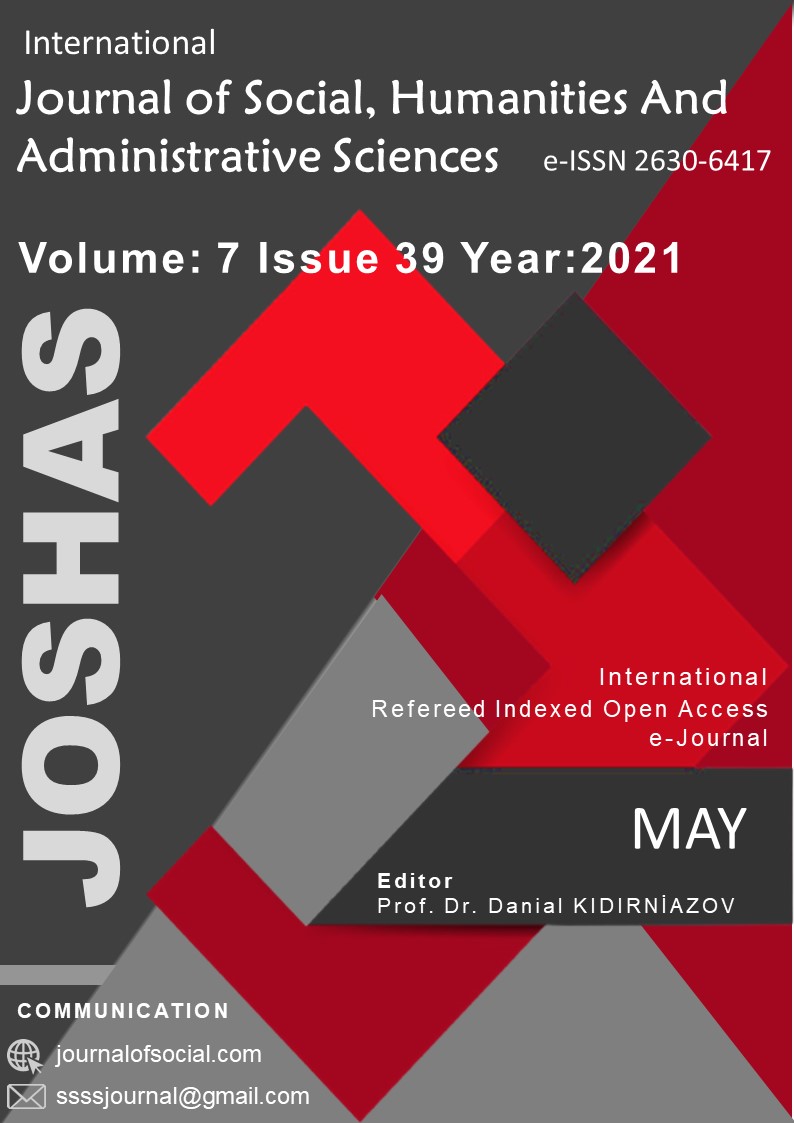Author :
Abstract
Tarikatlar, İslam’ın ruhani kısmını Peygamberinin temsil ettiği kişiliğiyle tamamlayarak teşkilatlanmış ve günümüze kadar yaygınlaşarak gelmiş şeklidir. İslam’ı yanız kaidelere bağlamayıp, onun iç dünyasına ulaşmak ve dolayısıyla manevi hayatı, maddi hayata üstün kılmaktı. Arapgir’in Türk egemenliğine dâhil olmasıyla, Osmanlı devri öncesi dinî yapılarla donandığı, mevcut eserlerden anlaşılmaktadır. Ulu Cami ve yanındaki hankah tasavvufi yapılanmayı işaret eden mekânlardır. Osmanlı Devleti’nin sancak merkezlerinden biri olan Arapgir bu dönem sosyal, iktisadi, dinî ve ilmî sahalarda gelişme kaydetmiştir. Özellikle yetişmiş insan gücü yönünde İstanbul’da sarayda dikkat çekmekteydi. Ömer Baba(Nuran) günümüzde Arapgir ve civarlarında bilinmekteyse de hakkında matbu bilgiler çok yüzeysel bulunmaktadır. Araştırmamızda ailesi ve Ömer Baba hakkında bilgi sahibi olanların bilgilerine başvuruldu. Anlatılan kerametler konusuna girilmedi. Öğrencisi olan Vehbi’nin yazdığı, övgü türündeki manzum eser üzerinde çalışıldı. Osmanlıca metnin transkripsiyonunu ve sadeleştirilmesine gidilerek manzum şekliyle aktarıldı. Metnin tasavvufi ve edebi özellikleri üzerinde durulmadı. Terzi Baba’nın öğrencisi ve Elâzığlı Hacı Ömer Baba’nın hocası vasfını taşımaktaydı. Böyle bir tasavvuf ehlinin az tanınması veya akademik alanda yer almayışı bir kayıptır. Ömer Baba sade ve sıradan bir hayatı tercih etti. Bu seçimi, bilgi sahibi olmamızı güçleştirdi. Öğrencilerinin kaydettiği bilgilerin olduğu söylenmekte, bunların elde edilmesi ümidini de taşımaktayız. Ömer Baba’nın bağlı olduğu Nakşi Halidi tarikat ile ilgili kısa bilgi verilerek, tarikatın işleyişine girilmedi. Bilinmeyen bir manevi değer hakkında kıt kaynaklar çerçevesinde bu makale hazırlandı.
Keywords
Abstract
Sects have been organized by completing the spiritual part of Islam with the personality represented by the Prophet, and it is a form that has spread to the present day. It was not to attribute Islam to lonely rules, but to reach its inner world and thus to make spiritual life superior to material life. It is understood from the existing works that Arapgir was equipped with religious structures before the Ottoman period with its inclusion in Turkish rule. The Grand Mosque and the hankah next to it are places that point to the mystical structure. Arapgir, one of the starboard centers of the Ottoman Empire, has made progress in social, economic, religious and scientific fields during this period.Especially in the direction of trained manpower, it attracted attention in the palace in Istanbul. Although Ömer Baba (Nuran) is known today in Arapgir and its surroundings, the printed information about him is very superficial. In our research, the information of those who had information about his family and Ömer Baba was consulted. The topic of the stories described was not mentioned. It was studied on a poetic work in praise type written by Vehbi, who was his student. Transcription and simplification of the Ottoman text was conveyed in the form of poetry. The mystical and literary characteristics of the text were not emphasized. He was a student of Tailor Baba and was the teacher of Hacı Ömer Baba from Elazığ. It is a loss that such a sufi people are under-recognized or not involved in the academic field. Ömer Baba preferred a simple and ordinary life. This choice made it difficult for us to have information. It is said that there is information recorded by its students, and we also hope that they will be obtained. The functioning of the sect was not entered into by giving brief information about the Nakshi Khalid sect to which Omar Baba was affiliated. This article was prepared within the framework of scarce sources about an unknown spiritual value.
Keywords
- Albayrak, N. (2011). “Terzi Baba”, Diyanet İslam Ansiklopedisi, (40): 521-522, İstanbul.
- Albayrak, N. (2011). “Terzi Baba”, Diyanet İslam Ansiklopedisi, (40): 521-522, İstanbul.Algar, H. (1997). “Halidiyye”, Diyanet İslam Ansiklopedisi, (15): 295-296, İstanbul.Ateş, S. (t. y.). Divan-ı Sırrı Hacı Muharrem Hilmi, Yeni Ufuklar Neşriyat, İstanbul.
- Ateş, S. (1997). “Hacı Muharrem Sırrı Efendi” , Kuran Mesajı İlmi Araştırmalar Dergisi, cilt I ( 2): 13-23Ateş, S. (2007). Ömer Hüdayî Baba Divanı, Yeni Ufuklar Neşriyat, İstanbul.
- Banarlı, N.S. (1987). Resimli Türk Edebiyatı Tarihi I, Milli Eğitim Basımevi, İstanbul.
- Bilgili, İ. (2017). “Muhammed Kudsî el-Bozkırî (Memiş Efendi)”, Şehir ve Âlimleri Sempozyumu Kitabı, 11- 12 Kasım 2016, (Editörler, Ramazan Altıntaş vd.), Necmettin Erbakan Üniversitesi, 247-260, Konya.
- Birol, N. (2019). “XIX Yüzyıl Sonlarında Erzincan’da İdari, Siyasî Sosyal ve Dinî Hayat”,
- Uluslararası Erzincan Tarihi Sempozyumu Bildiriler Kitabı 26- 28 Eylül 2019 (Editörler, Kemal Taşçı vd.) Erzincan Binali Yıldırım Üniversitesi, 1270-1309, Erzincan.
- Çoban, A. (2018). 19. Yüzyıl Konya’sında Nakşibendilik Şeyh Muhammed Bahaeddin Efendi ve Nakşilik Risalesi, Palet Yayınları, Konya.
- Devellioğlu, F. (1984). Osmanlıca-Türkçe Ansiklopedik Lugat, Aydın Kitapevi Yayınları, Ankara.
- Erdoğan, M. (1997). “Türk Edebiyatında Muhammes” I., Yüksek Lisans Tezi, Kırıkkale Üniversitesi Sosyal Bilimler Enstitüsü, Türk Dili ve Edebiyat Ana Bilim Dalı, Kırıkkale.
- Karabey, T. (2011). “Tarih Düşürme” , Diyanet İslam Ansiklopedisi, (40): 80-82, İstanbul.
- Kavak, A. (2013). “Mevlana halid-i Bağdadi ve Halidi Tasavvuf Geleneğinin Tarihi Gelişim Süreci”, Doktora Tezi, Atatürk Üniversitesi, Sosyal Bilimler Enstitüsü Temel İslam Bilimleri Anabilim Dalı, Erzurum.
- Levent, C. (2011). “Arapgir Tarihi”, Basılmamış Çalışmalar, Arapgir.
- Levent, C. (2012). Ömer Baba Nurani Arapgir’in Manevi Dergâhı Tekke, Yayınlanmamış Çalışmalar, Arapgir. TTK, Türk Tarih Kurumu, https://www.ttk.gov.tr/tarih-cevirme-kilavuzu/ ( Erişim: 25 Nisan 2021).
- Uludağ, S. (1997). “Anadolu’da Halidilik”, Diyanet İslam Ansiklopedisi, (15): 296-299, İstanbul. Uzun, M. (1994). “Ebced”, Diyanet İslam Ansiklopedisi, (10): 68-70, İstanbul.
- Yılmaz, H.K. (2004). Anahatlarıyla Tasavvuf ve Tarikatlar, Ensar Neşriyat, İstanbul. Yılmaz, H.K. (2010).300 Soruda Tasavvufi Hayat, Erkam Yayınları, İstanbul.
- Yiğit, N. (1997). “Arapgir Folkloru”, Lisans Bitirme Tezi, İnönü Üniversitesi Eğitim Fakültesi Türk Dili ve Edebiyatı Eğitimi, Malatya.
